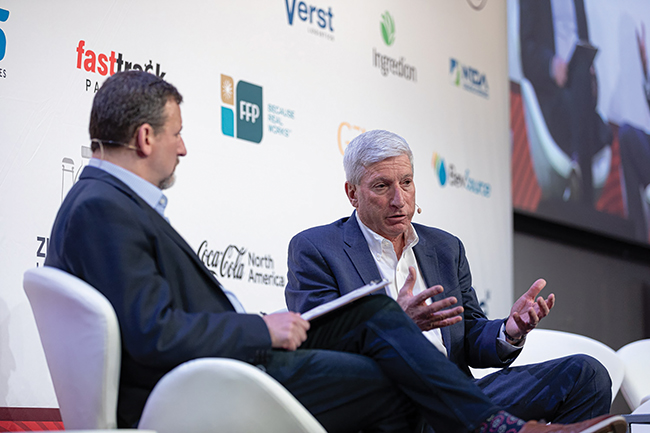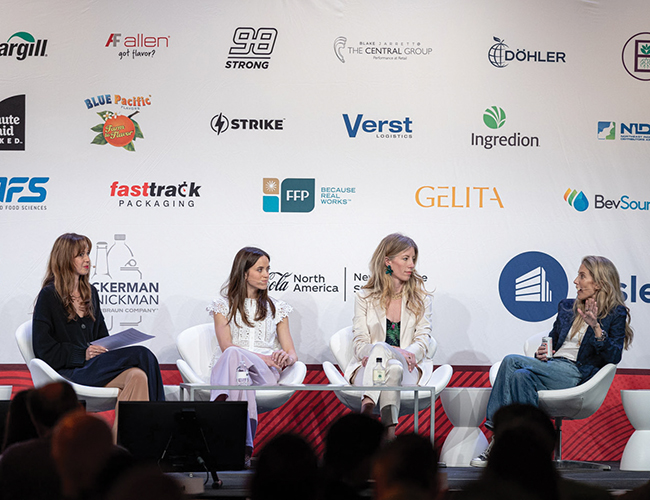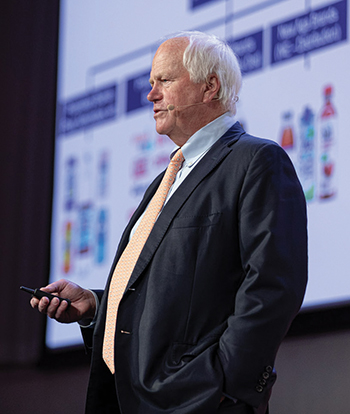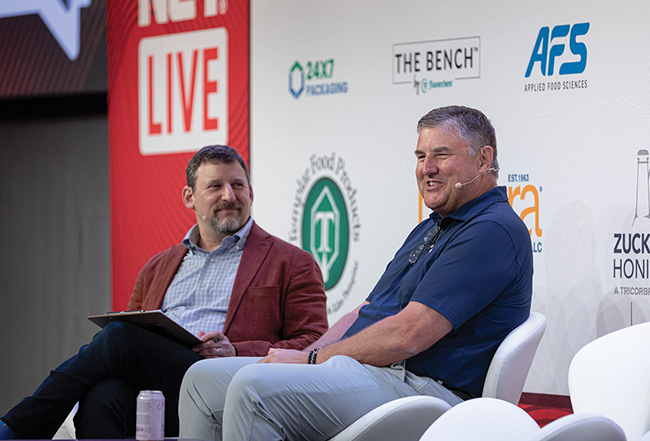BevNET Live Summer 2025 Recap
BevNET hosted its annual summer conference this June in New York City with a program full of the industry’s smartest and most innovative minds. The two-day conference featured industry leaders and stakeholders offering lessons in retail growth strategies, insights in scaling and coaching budding beverage entrepreneurs on the best practices for investment during challenging economic times.
The event kicked off with VOSS Americas CEO Jack Belsito explaining how his decades of experience as an executive has shaped how he currently makes decisions. Belsito explained that in his first stint at VOSS to his time as CEO of Snapple and later Health-Ade, he has learned when it’s beneficial to diversify a brand’s portfolio and when it might “choke the winner.”
After a panel discussion about funding collectives, another seasoned beverage executive, Ben Mand, presented his approach to leadership. Mand, who took over the head job at Yerba Madre (formerly Guayaki) in March 2024, discussed why and how he approached changing the yerba mate drink’s name.
Mand spoke broadly about the challenges of refocusing a brand as an incoming executive and why it is important to find out “what you need to hear, not what you want to hear.” Over his time leading Harmless Harvest and marketing roles at various CPG food brands, Mand has developed a strategic toolkit that he implements to reshape a business and prepare it for the next stage of growth.
Day one’s afternoon session included a panel of adult non-alcoholic (ANA) brand leaders — De Soi’s Scout Brisson, Little Saint’s Megan Klein and Jill Sites from Pathfinder — discussing their various approaches to building the increasingly popular category.
The group talked about how the target demographic for the ANA category is not concentrated solely on the Gen-Z consumers who are abstaining from alcohol. While that generation will continue to grow the category, millennials are one of the key groups changing their consumption behaviors and looking for premium-positioned alternatives to popular cocktails or alcoholic drinks.
Harnessing the enthusiasm behind the ANA category was represented on the panel in a variety of forms. While some brands like De Soi or Little Saints have used the wellness community and functional ingredients as a focal point for driving growth, Pathfinder has taken a more traditional beverage-alcohol approach, targeting on-premise locations. Sites, who is Pathfinder’s EVP of Sales, spoke about diversifying the message with partners to be an ANA option or a great mixer. This strategy expands the brand’s value proposition but also refrains from villainizing distribution partners’ portfolios.
“We were built as a brand that wanted to be with alcohol,” said Sites. “I don’t think that spirits are going away. I think they’re on a slight decline. But if you have a distribution network, it’s important that you try to help them.”
On the second day’s session, the slate of speakers and panelists tackled topics ranging from the relationship between convenience store chains and emerging beverage brands to scaling startups into category competitors. Veteran leaders Mel Landis, president of Olipop, and Polar Beverage CEO Ralph Crowley Jr. addressed their respective philosophies of building incremental growth so independent brands can compete against larger strategics.
Yet, moving from being an insurgent phase to an acquisition target can be a balancing act. Nicholas Giannuzzi, founding partner at Humble Growth, said that “you have to be pretty big in the beverage industry right now for a strategic to have interest.”
Giannuzzi calculated a brand’s revenue to be upwards of $300 million, yet creating value is more than just what shows up on a P&L statement. The key is to focus on core principles and filling “a white space that is evolutionarily different,” he said.
Chobani’s chief customer officer John Frost spoke later in the day about maintaining a “challenger mindset” as he moved from his long career at PepsiCo to the “30th largest CPG company in the country.”
While Chobani’s founder Hamdi Ulukaya has set the tone and philosophy for the company, it is up to Frost and his team to execute on that mission. Frost explained that while publicly traded companies answer to shareholders who expect profits, Chobani’s philosophy is that a people-over-profit mindset can lead to successful business metrics.
Chobani’s approach to innovation and stepping into new categories is based on taking a “long view” of incrementality. While it started as a Greek yogurt maker, Chobani has found ways to become a category leader in plant-based milks, creamers and, increasingly, ready-to-drink coffee with its investment and then acquisition of La Colombe.
“A lot of the top consumer packaged goods companies don’t have the tolerance to wait six years to get to a ten-share of a [category] segment,” Frost said.


Receive your free magazine!
Join thousands of other food and beverage professionals who utilize BevNET Magazine to stay up-to-date on current trends and news within the food and beverage world.
Receive your free copy of the magazine 6x per year in digital or print and utilize insights on consumer behavior, brand growth, category volume, and trend forecasting.
Subscribe


